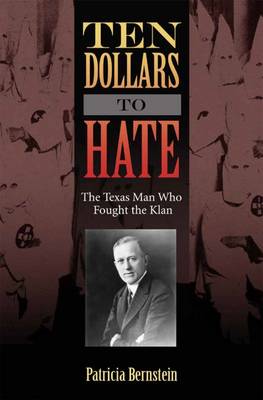Sam Rayburn Series on Rural Life, sponsored by Texas A&M University-Commerce
1 total work
Ten Dollars to Hate tells the story of the massive Ku Klux Klan of the 1920s-by far the most "successful" incarnation since its inception in the ashes of the Civil War-and the first prosecutor in the nation to successfully convict and jail Klan members. Dan Moody, a twenty-nine-year-old Texas district attorney, demonstrated that Klansmen could be punished for taking the law into their own hands-in this case, for the vicious flogging of a young World War I veteran.
The 1920s Klan numbered in the millions and infiltrated politics and law enforcement across the United States, not just in the Deep South. Several states elected Klan-sponsored governors and US senators. Klansmen engaged in extreme violence against whites as well as blacks, promoted outrageous bigotry against various ethnic groups, and boycotted non-Klan businesses.
A few courageous public officials tried to make Klansmen pay for their crimes, notably after Klan assaults in California and Texas and two torture-murders in Louisiana. All failed until September 1923 when Dan Moody convicted and won significant prison time for five Klansmen in a tense courtroom in Georgetown, Texas. Moody became a national sensation overnight and went on to become the youngest governor of Texas at the age of 33.
The Georgetown cases were the beginning of the end for this iteration of the Klan. Two years later, the head of the Klan in Indiana was convicted of murdering a young woman. Membership dwindled almost as quickly as it had grown, but the Klan's poisonous influence lingered through the decades that followed. Ten Dollars to Hate explores this pivotal-and brutal-chapter in the history of America.
The 1920s Klan numbered in the millions and infiltrated politics and law enforcement across the United States, not just in the Deep South. Several states elected Klan-sponsored governors and US senators. Klansmen engaged in extreme violence against whites as well as blacks, promoted outrageous bigotry against various ethnic groups, and boycotted non-Klan businesses.
A few courageous public officials tried to make Klansmen pay for their crimes, notably after Klan assaults in California and Texas and two torture-murders in Louisiana. All failed until September 1923 when Dan Moody convicted and won significant prison time for five Klansmen in a tense courtroom in Georgetown, Texas. Moody became a national sensation overnight and went on to become the youngest governor of Texas at the age of 33.
The Georgetown cases were the beginning of the end for this iteration of the Klan. Two years later, the head of the Klan in Indiana was convicted of murdering a young woman. Membership dwindled almost as quickly as it had grown, but the Klan's poisonous influence lingered through the decades that followed. Ten Dollars to Hate explores this pivotal-and brutal-chapter in the history of America.
